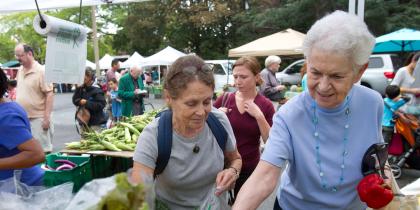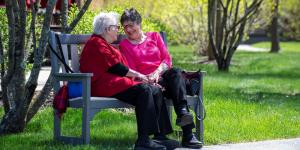Malnutrition in Seniors: What it is, why it’s bad, and how we can stop it
A guide to the problems and solutions of malnutrition in seniors

Malnutrition is exactly what it sounds like – a lack of nutrition. However, the reasons why it so often effects seniors is more complex. Usually, it’s a combination of problems, some of which include:
- Health care issues - Older adults often have health concerns that can lead to decreased appetite or trouble ingesting food, which could be caused by:
- Alzheimer’s Disease or other forms of dementia
- Dental issues or difficulty swallowing
- Side effects of medication
- Diminished sense of taste or smell
- Abdominal pain
- Restricted diets – Many older adults are on restricted diets for health reasons, like diabetes, high blood pressure, etc. Though these diets might help manage a chronic illness, they can lead to very limited food choices.
- Fixed/limited income - Some seniors are unable to afford adequate groceries, especially if they are taking expensive medications.
- Limited mobility - Many older adults do not drive and may not have access to food or the right types of food.
- Depression - Grief, loneliness, failing health, and other factors might contribute to depression, which often causes a lack of appetite.
This is a problem because malnutrition can often lead to dire health care complications, including:
- A weak immune system (increasing the risk of infections)
- Poor wound healing
- Muscle weakness and decreased bone mass (which can lead to falls and fractures)
- A higher risk of hospitalization
- An increased risk of death
Many states throughout the country have recognized the problems that malnutrition causes for seniors, as well as the healthcare system. In Massachusetts, the Executive Office of Elderly Affairs (EOEA) has gone so far as to create an advisory commission called the Malnutrition Prevention Commission for Elders to help combat malnutrition in seniors.
Hebrew SeniorLife’s own Dalia Cohen, Senior Clinical Dietitian at Hebrew Rehabilitation Center, was nominated, selected, and recently sworn in to serve as a member of this commission.
As Dalia says, “The Commission will be on the cutting edge of public policy, and be able to make a real difference in the lives of our state’s older adults. Among other issues, the Commission will study the effects of malnutrition in older adults, and ways to reduce the incidence and impact it has on seniors and the health care industry. Malnutrition can have terrible repercussions on quality of life, and can put a heavy burden on health care spending. Luckily, we believe that malnutrition is preventable, and we aim to find new ways to reduce the incidence of malnutrition in Massachusetts seniors.”
So what can you do to prevent malnutrition in seniors you love? The most important thing is to be observant. If you notice that your loved one is losing weight, gaining weight, seems weak, or has wounds that are slow to heal, speak up. Ask your loved one about their daily eating habits, and take a peak in the kitchen to see what kinds of foods are in stock. Most importantly, encourage your loved one to talk to their doctor about their nutritional needs.
Blog Topics
Learn More
Long-Term Chronic Care
Hebrew Rehabilitation Center provides person-centered extended medical care in a homelike setting for patients with chronic illness. As a licensed long-term chronic care hospital, we provide higher-level, more comprehensive medical care to older adults than a traditional nursing home.




